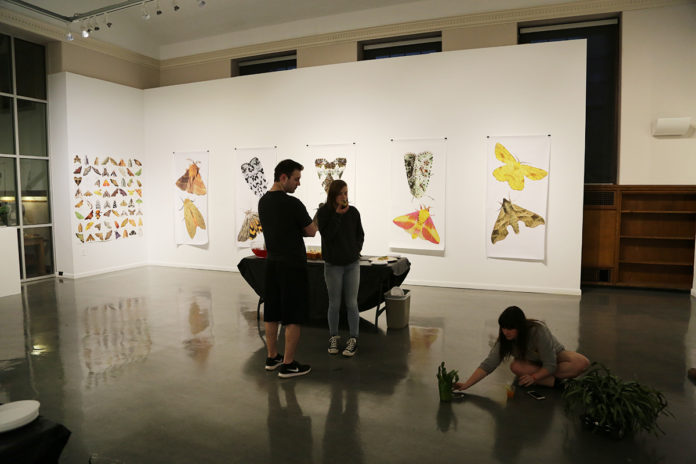From March 27 through April 14, the Martha Gault Art Gallery showcased “Adaptation” by Jeff Schmucki and Wendy DesChene, professors from Georgia Southern University and Auburn University, respectively. “Adaptation” included PlantBots, an invention that included engineered crop plants, and the importance of pollination that exclusively studied moths – second shift pollinators. This exhibition was displayed as part of SRU’s Sustainability Month. A reception for the gallery was held on April 11 from 5:30 p.m. until 7:30 p.m. where students and faculty gathered to see the refreshing take on the relationship between art and biology.
“It was interesting to see the combination of sciences of biology and adaptation installation work,” senior art major Kayley Thomas said. “The exhibitions that go on overall help students develop their work and get a visual example.”
One of the PlantBots with wheels attached zoomed around the gallery while other bots danced to songs like “Dynamite” by Taio Cruz. The lighthearted atmosphere also brought light to the fact that bees are dying at an alarming rate, and science is trying to come up with solutions to the “What If?”. The bee population has been down about 60 percent since 1950. The gallery shed a light on the possible solution: moths.
Senior art major Nikki Wakefield weighed in on the reality.
“I think this is really cool and brings up the question of, ‘what do we do if the bees do not exist anymore?’” Wakefield said.
Pollination plays a vital role in balancing the ecosystem. Moths could potentially take on the responsibility of food crop pollinators if the bees can no longer do so.
“They actually pollinate our food plants just as much as bees!” director of the Martha Gault Art Gallery Theresa Antonellis said. “The beautiful moths are represented in these massive, larger-than-life sized portraits to emphasize their importance in our food system.”
The capabilities of moths are not usually discussed. They have more to them than just hanging around your porch light on summer nights; they are also a great indicator to changes in the ecosystem because of their sensitivity. It is important that humans take care of the ecosystem for plants and animals as they do for us.
“We humans are only here as part of natural and biological systems that are much more important than our own agendas, agendas that are harmful to helpful animals like moths,” Antonellis said.
This gallery was a great way to show the effort that experts are putting into a world without bees. Hopefully, the world will not have to suffer these consequences.








